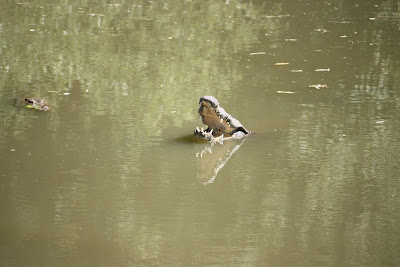As our plane approached Dakar late Friday night, coming in from over the Atlantic Ocean the city lights presented a spectacular perspective of the city, but little evidence of a country on the brink of dramatic change. Dakar, also know as Presqu'ile, or "almost island" since it is nearly completely surrounded by the ocean, by night seemed highly concentrated within a very small area along the coastline.
 |
| Beautiful Dakar, Senegal |
But as we explored the city the next day, what we saw was a city growing rapidly, with partially constructed buildings sprouting up everywhere we looked, and even as we left Dakar, deep into the suburbs the endless residential construction did not seem to end. In fact, the decrepit single-runway airport we had just landed at is about to be replaced by a brand new one further inland, to be connected to the city by a brand new tollway going up right now (along the route to our final destination in Thiès, #Senegal.) The land on which the airport currently sits is just too valuable as oceanfront property to house an airport.
I'd say my first impressions of this country and the wonderfully friendly people of this nation are quite different than what I was expecting. I have been entirely comfortable, with no real loss in amenities. I have taken hot showers, found most places we've visited, including our hotel rooms, effectively air conditioned, and I have had no problems recharging my iPhone! I've even been provided with a local cell phone that may seem dated (no touchscreen) by our Western standards. But if anything, it shows that the digital divide in Africa is rapidly closing, and that technology - mobile in particular - seems to truly be the great equalizer.
 |
| Samsung still rules here. |
And the countryside we travelled through was anything but deserted or barren. In fact, it was absolutely lush and green, as Senegal is just coming out of the rainy season. The roadways are bustling with locals selling their fruits and vegetables. And baobab trees, made famous by the children's novella "The Little Prince", dot the landscape for as far as the eyes can see.
 |
| Road to Thiès |
As foreigners we have stood out like a sore thumb and are constantly being hounded by the hawkers and beggars, but I have actually enjoyed the interactions with many of them. Despite their limited education, they have mastered basic phrases in many languages, and most are extremely adept at French, and some cases, even English. However, it is truly heartwrenching to see the young children and the handicapped, and I am looking forward to contributing to the future prosperity of the nation in a far more enduring way, as part of IBM Corporate Service Corps #ibmcsc.
Of course we have been advised by our IBM handlers to ignore or politely brush the hawkers and street kids aside, but sometimes it is hard to be rude to such friendly, entertaining and interesting people. I have made a few new "friends" on the streets of Dakar, like a young man named Ali who sold me 2 Senegalese wood carvings he apparently made himself with his own bare hands - which he was selling alongside a fellow who was first his brother, then his friend, and then back to being his blood brother. It was a playful banter, where he personalized the conversation masterfully. Each art piece started out at $25, but since I was his friend and as a #Canadian, a friend to his entire nation (alluding to the visit last week by Prime Minister Stephen Harper), I could have one for $10. And as he followed me from our bus to the restaurant, I assured him that I would think about it, as I had no money on me. Not surprisingly, he was right there waiting for me when our lunch was over, and as my Indian colleagues were able to expertedly negotiate with his "brother" down to 2 for $10 or 2 for $12, he begrudingly matched the lower price I claimed would now be the only acceptable deal. For the spirited conversation, I threw in an extra $1 so he could "get something to eat".
And there was one more delightfully unforgettable conversation I had along the street there. It was with an older gentlemen who was trying to sell me some jewelry. His line: "My friend, how many wives do you have?" He was visibly disappointed in me when I said one, after which he espoused about the virtues of multiple wives and the great happiness of all three of his. He encouraged me for a good block to find a few more wives, without even trying to sell me any of his wares.
I believe it is this great spirit embodied in all the people we have met so far that will lead Senegal forward. Their openness has resulted in stability. Prosperity shall come next.
The postings on this site are my own and don't necessarily represent IBM's positions, strategies or opinions.



































